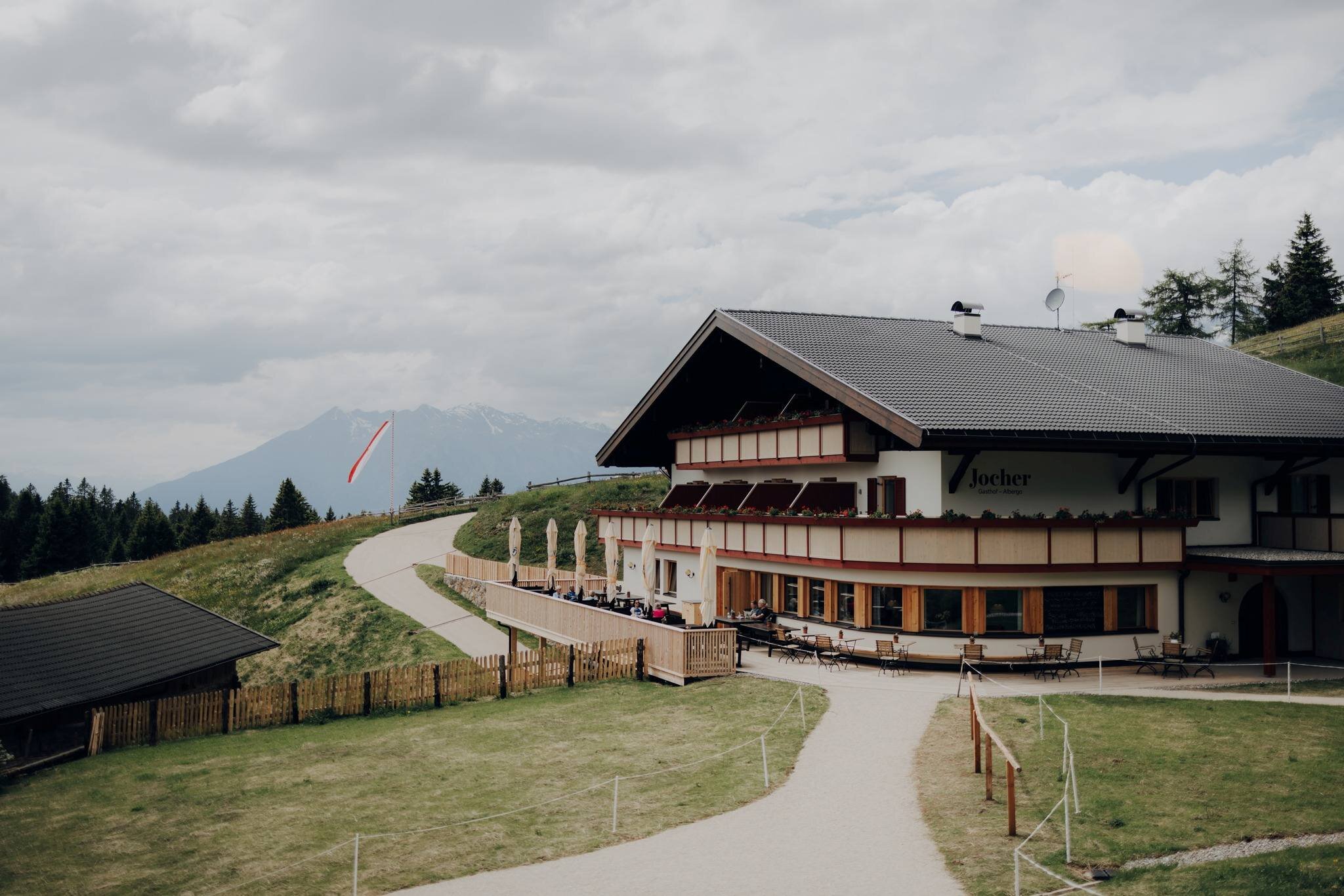
Sul Monte San Vigilio, la montagna di Lana, sospesa sopra i meleti e le palme dell’Alto Adige più inatteso, il tempo cambia passo: qui non si corre: si cammina, si osserva, si mangia. E nel farlo, si ascolta una storia fatta di legno, profumi e silenzi.
Totalmente chiuso al traffico e raggiungibile in funivia, San Vigilio è una terrazza naturale sul mondo. Un luogo dove la giornata si misura in passi e soste, e dove il cibo diventa racconto del territorio: canederli fumanti, mezzelune ripiene, salumi di malga, dolci caserecci, sciroppi fatti in casa e l’Acqua Meranese che sgorga da una fonte proprio qui, tra i prati.
È lungo questa montagna ovattata che si disegna un piccolo itinerario del gusto, fatto di soste che non sono semplici ristoranti, ma veri presìdi di memoria e accoglienza. Luoghi diversi, ma uniti dallo stesso identità antica: sedersi, condividere, lasciarsi raccontare dalla montagna. Ogni tavolo è una tappa, ogni rifugio una variazione sul tema della casa.
Stube Ida: il calore della memoria
A 1500 metri, Stube Ida è il cuore caldo di questa montagna.
Una stube vera, con la stufa in maiolica centenaria che un tempo riscaldava l’antico albergo di montagna dove oggi sorge il vigilius mountain resort.
Qui la tradizione altoatesina non viene musealizzata, ma riascoltata in chiave contemporanea: piatti semplici, ingredienti veri, atmosfera intima. Nelle giornate di sole, la terrazza diventa un salotto sospeso tra cielo e bosco, dove il pranzo si trasforma in una pausa lirica.
Ristorante Seggiovia: il gusto della vetta
Chi arriva a piedi, in bici o in seggiovia viene premiato con uno dei panorami più emozionanti del monte.
Il Ristorante Seggiovia è una sosta che sa di libertà: una terrazza aperta sul vuoto e una cucina che profuma di casa.
Andy e Jana accolgono gli ospiti con piatti della tradizione altoatesina, pasta fatta con cura, birre artigianali e succhi preparati da loro. È il posto dove ci si siede stanchi, ma ci si alza leggeri.
Gampl Alm: il regno della convivialità
Dalla stazione a monte della funivia, una passeggiata di 40 minuti (o una breve seggiovia seguita da 15 minuti in discesa) conduce alla Family-Alm Gampl, a 1700 metri.
Qui la montagna si fa famiglia: parco giochi, mini-zoo, spazi di relax, terrazza panoramica.
Ma soprattutto, una cucina che nasce dalla terra intorno: erbe e verdure dalla fattoria vicina, carne da contadini locali, dolci fatti in casa, succhi, marmellate, sciroppi e grappe di produzione propria.
È un luogo dove i bambini giocano, gli adulti si fermano, e tutti si sentono parte di qualcosa.
Gasthof Jocher: la tradizione che evolve
Poco sotto la chiesetta di San Vigilio si trova il Gasthof Jocher, una locanda di montagna che conserva l’anima di un tempo e lo sguardo verso il futuro.
Ai fornelli Sonja e David, fratello e sorella, riportano in vita le ricette altoatesine con sensibilità contemporanea. I piatti restano riconoscibili, ma si aprono a suggestioni (inter)nazionali, sempre nel rispetto degli ingredienti locali.
Da non perdere: le torte appena sfornate e il gelato artigianale, da gustare sulla nuova terrazza soleggiata con vista sui prati alpini.
La regione di Lana: dove il nord incontra il sud
Lana, insieme a Cermes, Pavicolo, Postal, Monte San Vigilio, Foiana e Gargazzone, vive in un microclima sorprendente: la barriera del Gruppo di Tessa protegge dal freddo del nord, permettendo a meli, ciliegi, orchidee e palme di convivere con castagni, larici e faggi.
È una terra di risonanze sottili: di passeggiate tra i meleti e sentieri in quota,
di masi rurali e strutture di charme, di cucina gourmet e ricette di montagna, di eventi culturali, musica e gusto.
Mountain huts, alpine inns and flavours on Monte San Vigilio, in the Lana region
On Monte San Vigilio – Lana’s mountain, suspended above orchards and palm trees in the most unexpected corner of South Tyrol – time changes pace: here you don’t rush, you walk, you observe, you eat. And in doing so, you listen to a story made of wood, scents and silences.
Completely closed to traffic and easily reached by cable car, San Vigilio is a natural terrace overlooking the world. A place where the day is measured in steps and pauses, and where food becomes a narrative of the land: steaming dumplings, filled half-moons, alpine cured meats, homemade cakes, syrups and the Merano spring water that flows from a source right here, among the meadows.
Along this hushed mountain runs a small itinerary of taste, made up of stops that are not simply restaurants, but true keepers of memory and hospitality. Different places, united by the same ancient identity: sitting down, sharing, letting the mountain tell its story. Every table is a stage, every hut a variation on the theme of home.
Stube Ida: the warmth of memory
At 1,500 metres, Stube Ida is the warm heart of this mountain.
A real stube, with a century-old tiled stove that once heated the historic mountain inn that stood where the vigilius mountain resort is today.
Here, South Tyrolean tradition is not frozen in time, but reinterpreted with a contemporary sensibility: simple dishes, honest ingredients, an intimate atmosphere. On sunny days, the terrace becomes a lounge suspended between sky and forest, where lunch turns into a lyrical pause.
Ristorante Seggiovia: the taste of the summit
Those who arrive on foot, by bike or by chairlift are rewarded with one of the most breathtaking views on the mountain.
Ristorante Seggiovia is a stop that tastes like freedom: an open terrace overlooking the void and a kitchen that smells of home.
Andy and Jana welcome guests with traditional South Tyrolean dishes, lovingly prepared pasta, craft beers and homemade juices. It is the place where you sit down tired and get up feeling light.
Gampl Alm: the realm of conviviality
From the upper cable car station, a 40-minute walk (or a short chairlift ride followed by a 15-minute downhill stroll) leads to the Family-Alm Gampl, at 1,700 metres.
Here the mountain becomes family: playground, mini-zoo, relaxation areas and a panoramic terrace.
But above all, a cuisine born from the surrounding land: herbs and vegetables from the nearby farm, meat from local farmers, homemade desserts, juices, jams, syrups and grappas.
It is a place where children play, adults slow down, and everyone feels part of something.
Gasthof Jocher: tradition evolving
Just below the little church of San Vigilio lies Gasthof Jocher, a mountain inn that preserves the soul of the past while looking to the future.
In the kitchen, siblings Sonja and David bring traditional South Tyrolean recipes back to life with a contemporary touch. The dishes remain recognisable, yet open up to (inter)national influences, always respecting local ingredients.
Not to be missed: freshly baked cakes and homemade ice cream, to be enjoyed on the sunny new terrace overlooking the alpine meadows.
The Lana region: where north meets south
Lana, together with Cermes, Pavicolo, Postal, Monte San Vigilio, Foiana and Gargazzone, enjoys a surprising microclimate: the natural barrier of the Texel Group protects it from northern cold, allowing apple trees, cherry trees, orchids and palm trees to coexist with chestnuts, larches and beeches.
It is a land of subtle resonances: of walks through orchards and high-altitude trails, of rural farmsteads and charming retreats, of gourmet cuisine and mountain recipes, of cultural events, music and taste.









